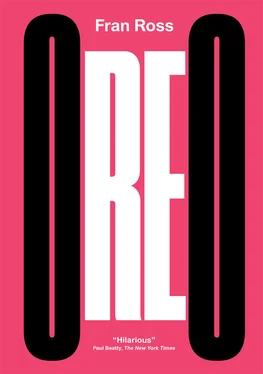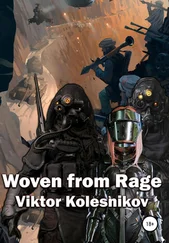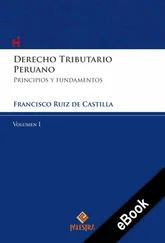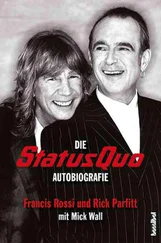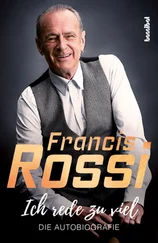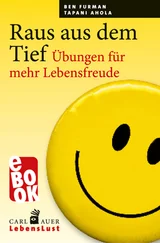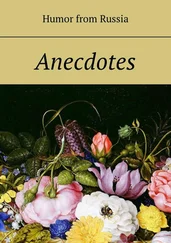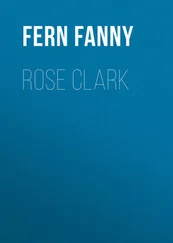“Ouch!” he said. “You got me that time, baby.” He smiled and glided toward her.
Oreo smiled back and dropped the money. The coins tinkled all over the sidewalk, but the pimp did not make a move toward them. His eyes glommed on to the ten-dollar bill. Oreo pretended to be preoccupied with gathering all her coins. She turned away from Parnell. In that split second, he bent over to pick up the bill. In the second half of that split second, Oreo turned back to see a lovely close-up of his rear. She drew back her walking stick like a pool cue and (decisions, decisions) leaned toward ball-breaking or buggery. Oh, hell, she decided, I don’t want to get pimp shit all over his nice cane. She switched her grip and instead gave him a grand-slam clout across the ass. If his howl meant anything, it meant that he was now the only person on the block with four cheeks to sit on. Parnell staggered and fell into the gutter. As Oreo ran down the street, she saw three things happen. One, a sanitation truck came into the street. Flush! Two, all up and down the street, witnesses to the flushing, at the extreme edge of hysterical laughter, clung to their windowsills (Parnell’s suit was ruined, but the water merely beaded on his boots and ran back into the gutter). Three, Parnell’s women appeared at the door, a look of revelation on their faces.
Oreo catching her breath around the corner
She smiled her cookie smile every time she thought of Parnell’s sodden rise from the gutter. His arms extended like wings away from his soiled and dripping suit, his fingers spoked out from his palms at a web-splitting stretch. Oreo hoped that the look of revelation on the faces of the prostitutes meant that they had discovered Parnell was vulnerable. If one stranger could whip his ass, why not ten friends?
Oreo knew she would have to be careful as she roamed around the neighborhood waiting for her father to show up at the whorehouse. Parnell did not look like the kind who would take to humiliation like a swan to lakes. As soon as he changed his clothes, he would probably be out looking for her — a drag, since she had to hang around to try to catch Samuel before he started catting.
Oreo was hungry. She ducked into a luncheonette, sat in a booth in the back, and ordered a hot-sausage sandwich, a Shabazz bean pie, and a Pepsi.
The woman behind the counter, obviously the owner, was huge, a giant high-yellow Buddha. To the tune of “St. Louis Woman,” she sang, “I hate to see my only son go down, I hate to see my only son go down.” She repeated these lines thirty-seven times. The repetition was driving Oreo mad — she wanted to hear the rest of the parody.
The woman beckoned to her when the sausage was ready. Oreo carried the food to the booth herself. No one else was in the place. The woman did not seem inclined to talk, had merely grunted, to show she had heard, when Oreo ordered, and now went back to her copy of Vogue . Oreo did a double take. Vogue ? She had misjudged the woman. Harper’s Bazaar , yes; Vogue , no, she would have sworn. Oreo now saw that she had missed the gaining-circulation squint of the eyes, the condé nast flare of the nostrils. Oreo was disappointed in herself. It was like mixing up the Brontës. After all, Branwell’s staggering style was not Anne’s.
The whole episode was an affront to Oreo’s judgment, and she resolved to be less quick to snap in future. For example, what of the only son the woman was so musically concerned for? Oreo could not refrain from wondering, Is he real or imaginary? She was at first inclined to think real. A woman with the proprietor’s solidity gave one the impression of practicality, a reflex grasp of — no, a stranglehold on — everyday life. Such a woman, with her banana fingers, might well despair of the sexual proclivities of any son who was not a Kodiak bear and hence, to forestall such despair, would train up her child in the way he should go, which would be in any direction but down. Any blow jobs connected with any son of this mother would be to, not fro. Another point: the reader of Vogue was ofttimes a traditionalist. A traditionalist would wear at all times — waking and sleeping, resting or laying waste the countryside — a wedding ring. Oreo looked again at the banana fingers of the left hand. No band of gold bruised the bunch. This, of course, was not conclusive proof. It would be hard to find a ring that could contain those plantains. What is more, a store owner might think it politic to keep valuables that were not for sale out of sight of thieves. But Oreo felt that if this woman had a ring, she would wear it — and let thieves come if they dared. No, she was not married; she had no relatives, not even a sonlike nephew to sing about. Nephews who worked for her would toil around the clock and think twice before complaining about the low wages — and there was no nephew in sight. Q.E.D. The copy of Vogue was again the crucial clue. It took imagination to persist in reading a magazine whose cover date was January, 1928. Yes, the only son of the song was— mirabile cantabile (which in Oreo’s pidgin Latin meant “wonderful to sing”) — imaginary.
Oreo finished her bean pie, took a last swig of Pepsi, and paid the check. She said good evening to the proprietor, who grunted, licked her finger, and turned a page of her magazine. This Sakyamuni was now sitting on one of her counter stools, her apron hammocked across her knees. If she sat like that much longer, impassive and idol-like, she would present a cruel temptation to deranged incense burners in the neighborhood.
Oreo pushed open the screen door. She raised her chin to sniff the dark, peppery air outside the luncheonette, when suddenly her left arm made a distinct L behind her back. Her walking stick was jerked from her right hand. She turned her head. Out of the corner of her eye, she could see Parnell. “Oh shit,” she said softly.
“Um-hm,” Parnell gloated. “Got you by the short hairs this time, baby.”
“Can we talk this over?” Oreo asked.
“Oh, we gon talk it over, all right — and then some.” Parnell was marching her down the street with her arm still behind her back, making no attempt to hide the fact that he was coercing her. People looked on with perhaps a shade less curiosity than they would have lent to a change of traffic light.
One man greeted Parnell with “What’s the haps, my man? See you got a new worker for the vineyard. She saying something too. Choice cut, man, choice,” he said, looking Oreo up and down. She looked him up and down in retaliation, but he didn’t notice as he swung down the street.
Oreo wondered whether to use WIT on Parnell right on the street, but she decided to wait and see what kind of game he would try to run. She told him there was no need to twist her arm. “I’m not going anywhere. I’ll go along with your program.”
“You better believe it. I got something special in store for you, baby. You really gon dig it. That is, it gon dig you .” He chuckled to himself at his turn of phrase.
They turned into Parnell’s block. He relaxed his grip, out of fatigue. She could see now that he was wearing a suit of identical cut and style to the fine pink feathers he had strutted earlier. This one was midnight blue, more appropriate for evening. His boots too were blue-black and scintillated like a vein of anthracite struck by a miner’s Cyclopean lamp.
The hustler hustled Oreo up the front steps. Inside, the first floor was dark. All she could see was a light under a door at the end of a narrow hallway. They went up the stairs to the second floor. Parnell opened the door into a large square room with a huge wrestling mat in the center. On chairs around the periphery of the room were one little, two little, three little prostitutes, four little, five little, six little prostitutes, seven little, eight little, nine little prostitutes — where was the tenth? Oreo wondered. The black bottom woman was missing. The nine young women looked as if they were about to greet Oreo as a sorority sister. They started to make a place for her along the wall.
Читать дальше
